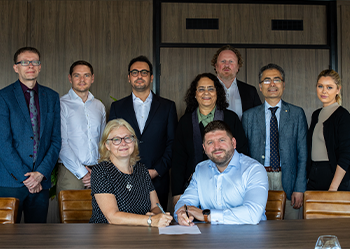University News Last updated 06 August 2024

At 155 metres tall, One Eastside is set to become the highest building in Birmingham’s soaring skyline when it is completed in 2026.
It will also be one of the healthiest and safest thanks to a new research partnership between Birmingham City University (BCU) and specialist residential developer, Court Collaboration.
Court Collaboration are delivering the 51-storey property that will consist of 667 one and two-bedroomed Build-to-Rent apartments on behalf of specialist insurer of defined benefit pension schemes, Pension Insurance Corporation (PIC).
Construction and AI experts at BCU are creating a virtual 3D model of the skyscraper – known as a digital twin – and will use this to monitor air quality and energy consumption. The goals are to ensure occupants are kept safe and to help the building run efficiently and sustainably. The project will also influence future building design.
Project lead Saeed Talebi, Associate Professor in the College of Built Environment at BCU, said: “I’m excited about the vision of making a real impact on the construction industry, the science behind the digital twin, and enhancing our student experience.”
Digital twins are used by engineering and manufacturing companies to improve efficiency in production, lower construction costs, and reduce water and energy waste. In this project, the digital twin will use artificial intelligence and machine learning technology to analyse data from sensors within the flats.
BCU students will gain applied experience of the construction industry through access to One Eastside, developing the skills and expertise required for a career in the built environment.
Alex Neale, Chief Executive Officer of Court Collaboration, said: “It’s exciting to collaborate with BCU on this project. The combination of cutting-edge technology and engaging with some of our city’s brightest minds is fantastic, but to know that the work will deliver enhanced safety and efficiencies across both construction and the future life of the building, is exceptional.
“Thanks to the support of our funding partner, PIC, One Eastside will deliver much needed high-quality build to rent accommodation in the city centre.”
Sam Winnard, Head of Build-to-Rent Operations at PIC, added: “As long term investors we expect to be operating One Eastside for many years to come. PIC are very supportive of the work BCU are undertaking which will provide long term tangible benefits to both operation efficiencies and the health and wellbeing of our residents, as well as offering an opportunity for talented students to apply their learning to a live asset.”
Professor Maxine Lintern, Pro-Vice-Chancellor for Research at BCU, said: “In an ever-increasing population, the only way for people to live in cities is often up.
“To ensure we provide quality homes for people in the West Midlands and across the UK, we must continually advance the sector through technological advances.
“BCU researchers are leading the way and we’re thrilled to partner with Court Collaboration, a company that mirrors our own values and aims.”
Housing accounts for 15% of UK greenhouse gas emissions – and the government’s Future Homes Standard requires the housing sector to hit net zero by 2025/6.
By providing a blueprint for safe, healthy, and environmentally friendly high-rise builds, BCU researchers will support the sector to optimise energy use and reduce carbon emissions.
Martin Weston, Senior Development Manager at BCU, added: “The falling cost of digital twin technologies means it will no longer be limited to a company’s most expensive builds.
“As it becomes more accessible, we hope to see its use and impact accelerate.”
Professor Hanifa Shah, Pro-Vice-Chancellor and Executive Dean of the Faculty of Computing, Engineering, and Built Environment (CEBE), commented: “BCU is at the forefront of Internet of Things (IoT) infrastructure and related concepts like the metaverse.
“Our researchers are helping to popularise digital twins to create better outcomes for society. In this instance, we can expect improved physical health for people living in the region.”
Professor Nick Morton, BCU Associate Dean for the Faculty of CEBE, said: “One Eastside is a flagship project for the city and for our partnership with Court Collaboration. The research will inform our curriculum, ensuring students benefit from these state-of-the-art innovations.”
Professor Huseyin Seker, BCU Associate Dean for Research, Innovation, and Enterprise for the Faculty of CEBE, and project co-lead said: “This partnership marks a significant and unique contribution to the digital transformation of the construction sector by creating a digital twin that will make such a tall building digitally driven, healthier, and safer.
“It’s a great example of how BCU is accelerating its research and expertise in digital transformation within the construction and built environment sectors by collaborating with national and international partners in academia and industry, and contributing to one of the four key industries identified by Innovate UK BridgeAI.”
“As a co-lead, leveraging my expertise in artificial intelligence and data science, I’ll be working closely with the team to ensure the success of this ground-breaking project.”